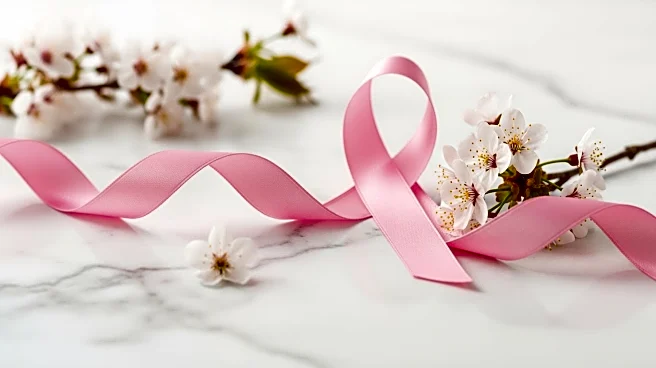What's Happening?
Felicity Rackstraw, a breast cancer blogger known for her candid writing, passed away in October after being diagnosed with breast cancer in 2022. She ran the blog 'My Traitorous Tit,' where she shared her experiences and advocated for breast cancer screenings
to be offered to younger women, as current legislation starts screenings at age 50. A celebration of life service is being held in Etruria, Stoke-on-Trent, honoring her vibrant personality and impact on the community. Rackstraw was supported by the Stoke-on-Trent cancer support group Pink Sisters and Misters, and her friend Janet Stanway emphasized the event as a celebration rather than a funeral, reflecting Rackstraw's lively spirit.
Why It's Important?
Rackstraw's advocacy for lowering the breast cancer screening age highlights a significant public health issue. Early detection is crucial for effective treatment, and her call to action could influence policy changes that benefit younger women at risk. Her blog and public discussions have raised awareness about the challenges faced by breast cancer patients, potentially prompting healthcare providers and policymakers to reconsider current screening guidelines. Her story underscores the importance of patient voices in shaping healthcare practices and policies, particularly in areas where early intervention can save lives.
What's Next?
The celebration of Rackstraw's life may inspire further advocacy and community engagement around breast cancer awareness and screening policies. Her friends and supporters might continue her legacy by campaigning for policy changes that align with her vision. Healthcare organizations and cancer support groups could leverage her story to push for legislative reviews and adjustments to screening age requirements. The event could also serve as a catalyst for broader discussions on patient-centered care and the role of personal narratives in influencing public health strategies.
Beyond the Headlines
Rackstraw's approach to her illness, characterized by humor and directness, challenges traditional narratives around cancer and terminal illness. Her story encourages a cultural shift towards viewing life with cancer as an opportunity for advocacy and community building rather than solely a personal struggle. This perspective can empower other patients to share their experiences and advocate for systemic changes. Additionally, her emphasis on celebrating life rather than mourning death may influence how society perceives and supports individuals facing terminal diagnoses.















